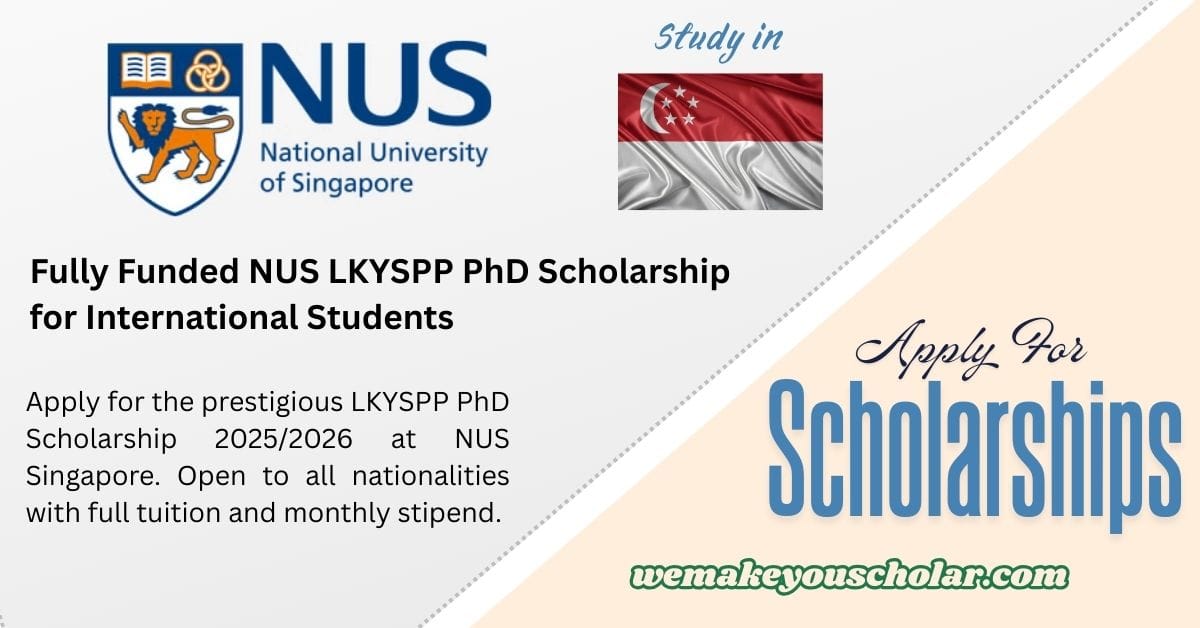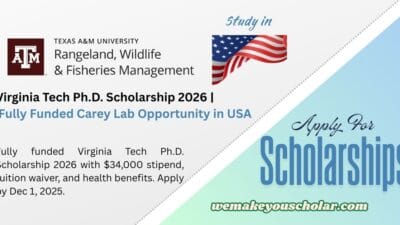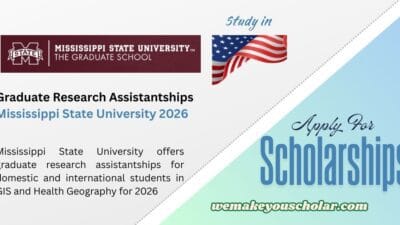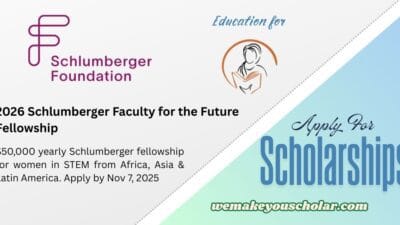Lee Kuan Yew School of Public Policy PhD Scholarship 2025/2026 – A Complete Student Guide
When students think about pursuing a PhD, the first thing that often comes to mind is cost. Tuition fees, living expenses, and research costs can easily hold back even the brightest minds. That’s where opportunities like the Lee Kuan Yew School of Public Policy (LKYSPP) PhD Scholarship step in. Based at the National University of Singapore (NUS), one of Asia’s most respected universities, this scholarship is not just financial support – it is a chance to study in one of the world’s most dynamic policy environments.
In this guide, we’ll go beyond the usual bullet points. You’ll get the facts – eligibility, stipend, and application process – but also the kind of insights that students actually look for: what life in Singapore is like, what makes LKYSPP unique, and why this scholarship might open doors not just to academia but also to leadership roles in governments, NGOs, and international organizations. If you’re curious whether this opportunity is worth chasing, this article should give you the clarity you need.
About the Lee Kuan Yew School of Public Policy (LKYSPP)
To understand the value of the scholarship, it helps to first understand the school behind it. The Lee Kuan Yew School of Public Policy, founded in 2004, carries the name of Singapore’s founding Prime Minister. That alone says a lot about its vision – it’s rooted in leadership, governance, and long-term impact.
Unlike many Western policy schools that approach governance primarily from Euro-American traditions, LKYSPP emphasizes Asian perspectives while maintaining a strong global orientation. Students here often work on questions like:
How can small states thrive in a globalized economy?
What policy frameworks help balance economic growth with environmental sustainability?
How can governments design inclusive policies in highly diverse societies?
It’s not just theory. Singapore itself is often described as a “policy laboratory.” A tiny country with limited natural resources, it has become a hub for finance, technology, and education thanks to strong governance. Studying policy here means watching real-world experiments unfold around you.
Why Consider a PhD at LKYSPP?
Doing a PhD is no small decision. It takes years, it requires persistence, and it only makes sense if the environment supports deep research. LKYSPP offers exactly that. Here’s why students from across the world choose it:
Global Recognition – NUS consistently ranks among the world’s top 15 universities. A PhD here carries international weight.
Access to Experts – Faculty members include leading scholars in political science, international relations, development, and economics.
Strong Research Culture – PhD students are encouraged to publish, attend conferences, and collaborate internationally.
Full Funding – The scholarship ensures you can focus on research, not bills.
Singapore’s Network – Beyond academia, Singapore connects you to ASEAN, UN agencies, and think tanks in Asia and beyond.
Eligibility Requirements
Let’s look at the official criteria first, then break down what they really mean in practice.
Academic Background
Applicants must hold a relevant Master’s degree in social sciences, public policy, economics, political science, international relations, or related disciplines.
A strong academic record is essential. This doesn’t just mean grades – publications, research projects, and even high-quality dissertations strengthen your profile.
Work Experience
Preference is given to applicants with at least two years of work experience. This could be in government, research, NGOs, or international organizations. Don’t panic if you’re fresh from your Master’s – you can still apply, but real-world experience helps your application stand out.
Research Interest
A deep passion for public policy and international affairs is expected. Your research proposal should clearly show how your interests connect to LKYSPP’s strengths.
Other Requirements
Two referees must submit recommendation letters.
Proof of English proficiency (TOEFL/IELTS) if your education was not conducted in English.
Scholarship Benefits
Here’s the part every student wants to know: how much financial support can you expect?
For Singapore Citizens: SGD 2,800 per month. This increases by SGD 500 after passing the PhD Qualifying Examination (making it SGD 3,300/month). Plus CPF contributions.
For Singapore Permanent Residents: SGD 2,400 per month, rising to SGD 2,900 after the qualifying exam.
For International Students: SGD 2,200 per month, rising to SGD 2,700 after the qualifying exam.
Other Key Benefits:
Full tuition fees are covered.
The typical scholarship duration is three years (with the possibility of extension if needed).
No service bond or post-graduation work requirement.
When compared to living costs in Singapore, this stipend is reasonable. Housing is the biggest expense, but NUS offers subsidized student housing. Many students manage comfortably within the stipend, especially with careful budgeting.
Application Timeline
Applications are tied to the NUS Graduate School admissions cycle.
January (Semester 2 Intake): August 1 – December 10
August (Semester 1 Intake): Usually February – June
It’s worth noting that competition is intense, so submitting early rather than at the last minute can give you an advantage. Faculty may start reviewing strong applications before the deadline closes.
Application Process – Step by Step
Research Your Fit
Before anything else, make sure your research interests align with what LKYSPP can support. Browse faculty profiles and ongoing projects.Prepare Documents
You’ll need:Academic transcripts
Master’s certificate
Curriculum Vitae (CV)
Statement of Purpose (which doubles as your research proposal)
Proof of English proficiency (if applicable)
Two referee reports
Apply Online
Submit your application via the NUS GradApp portal. Make sure to check the box that indicates you’re applying for the scholarship.Interviews
Shortlisted candidates may be called for an interview. This is where you should be able to explain your research in clear, confident terms.Wait for Results
Offers usually come out a few months after the application deadline.
Important Reminder: NUS has officially warned students about fraudulent agencies claiming they can guarantee admission. There are no shortcuts. Admission is merit-based, and fake documents will result in rejection and even blacklisting.
Life in Singapore as a PhD Student
Moving abroad for a PhD is not just about the research. Daily life matters too. So, what’s it like in Singapore?
Safety: Singapore is one of the safest countries in the world. Night walks back from the library? No problem.
Diversity: You’ll meet classmates from Asia, Europe, Africa, and the Americas. English is widely spoken, but you’ll also hear Mandarin, Malay, and Tamil.
Food: Affordable hawker centers mean you can eat like a king on a student budget. Expect to spend SGD 5–7 per meal.
Transport: The MRT (metro) system is cheap, clean, and reliable.
Housing: NUS provides student housing, though some PhD students choose to rent privately.
All of this adds up to an environment where you can focus on your research while still enjoying life outside the classroom.
Research Focus Areas
The PhD program allows for flexibility, but the school has particular strengths:
Governance and Institutions – Democratic systems, political accountability, and comparative politics.
International Relations – ASEAN, Asia-Pacific security, and global cooperation.
Development and Economics – Poverty reduction, economic policy, and inequality.
Sustainability – Climate change, urban planning, and green policies.
Your research proposal should ideally tie into one of these areas to ensure proper faculty support.
Career Pathways After Graduation
What happens once you finish your PhD? LKYSPP alumni can be found in academia, government, and global organizations. Common pathways include:
Academia – Many graduates go on to become professors or researchers.
International Organizations – Think UN, World Bank, IMF, ASEAN.
Government Roles – Advising ministries or policy think tanks.
Nonprofits/NGOs – Research roles focusing on policy, governance, or social development.
Graduating with the LKYSPP PhD is a strong signal to employers that you not only have technical expertise but also the ability to think about complex global challenges.
Tips for a Strong Application
Tailor Your Proposal – Show exactly how your research fits into LKYSPP’s focus areas.
Get Solid Recommendations – Choose referees who know your research abilities well.
Highlight Policy Experience – Even short stints with NGOs, consultancies, or ministries can help.
Stay Authentic – Don’t try to write what you think they want to hear. Clear, honest proposals stand out.
FAQs
1. Is the scholarship open to international students?
Yes, applicants from all nationalities can apply.
2. Do I need to have work experience?
It’s not mandatory, but it improves your chances.
3. How much is the monthly stipend?
SGD 2,200–2,800 depending on nationality, with an additional SGD 500 after passing qualifying exams.
4. Is there a bond requirement?
No, you are free to choose your career path after graduation.
5. How competitive is it?
Very competitive. Only a limited number of awards are available each year.
Conclusion
The Lee Kuan Yew School of Public Policy PhD Scholarship is more than just funding – it’s a gateway into one of the most dynamic policy schools in the world. With full tuition coverage, a living stipend, and the opportunity to study in Singapore’s unique policy environment, this scholarship offers everything you need to grow as a researcher and future leader. If your passion lies in shaping governance and tackling global challenges, this could be the opportunity that sets your career in motion.
For further details, please visit scholarship provider official website.




